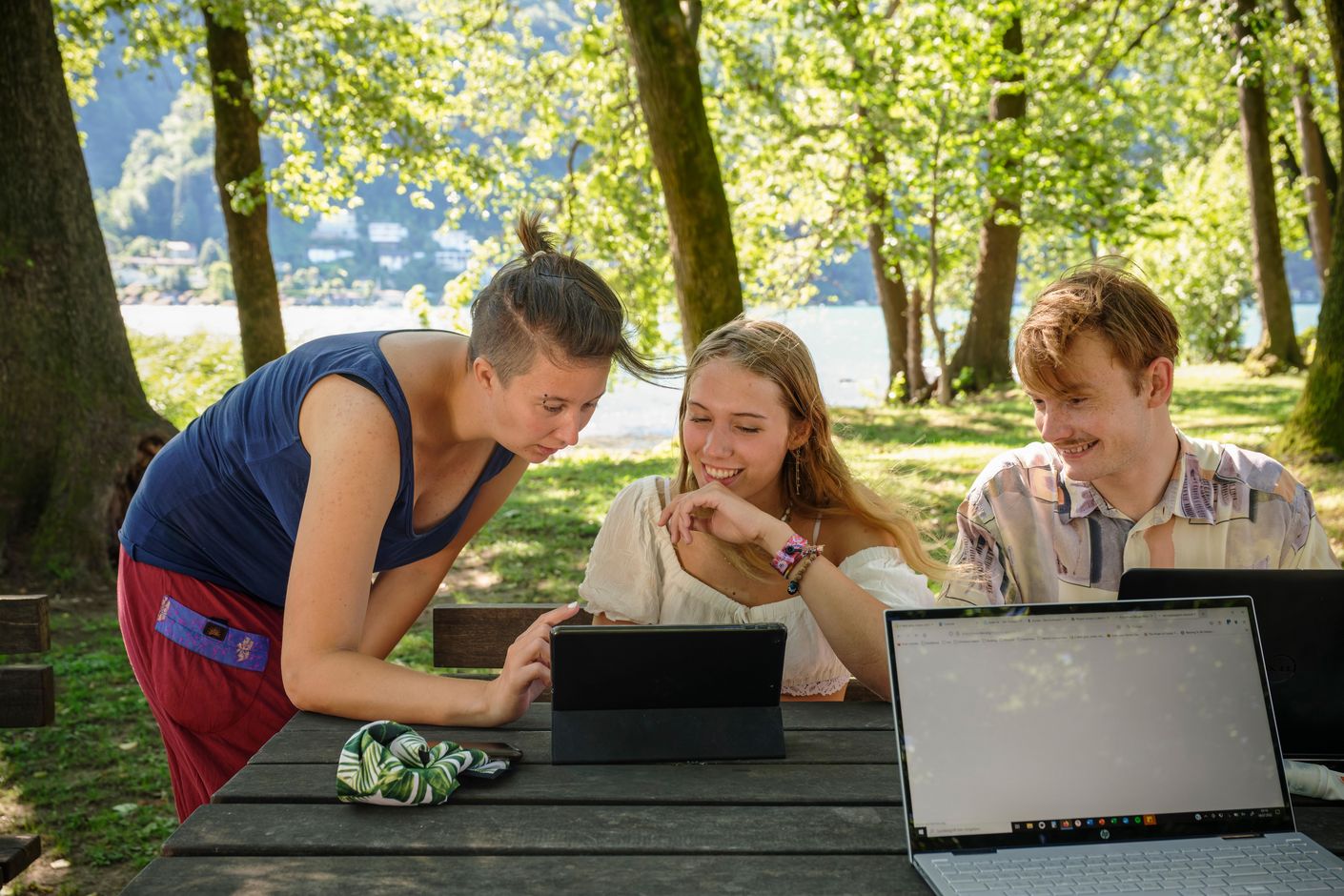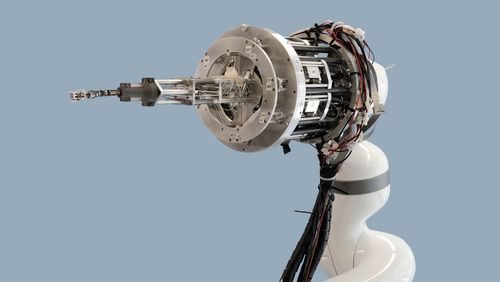
Hot topics, bright minds
At the summer academies organised by the Swiss Study Foundation, gifted students are invited to discover and critically examine approaches taken in disciplines different to their own – for example, by considering whether “ecosystem design” can be used to restore damaged natural environments. A report from “Centro Magliaso” on Lake Lugano in southern Switzerland, where the annual summer academies are held.
A breeze skims over the deep blue lake. Reeds rustle softly, and gentle waves roll onto the pebble beach. The wind is also moving through the branches of the old oak and beech trees in the park at Centro Magliaso. There, in the shade, three bright minds are hard at work: seated on wooden benches, Anna Buchholz, Anja Kattanek and Mathieu Dubied are adding the finishing touches to their presentation. Today is the final day at one of the three summer academies that are organised every year by the Swiss Study Foundation and financed by the Werner Siemens Foundation.
“Ecosystem design” is the topic of the week-long academy attended by fourteen students from Germany, Austria and Switzerland. The term “ecosystem design” stands for a new approach to restoring damaged – or creating new – ecosystems. For their group project, the trio in the park decided to tackle Lake Victoria in Kenya’s Kisumu region. “The lake and coastlines are polluted,” says twenty-five-year-old Anja Kattanek, who is studying for a master’s degree in education for sustainable development at the Catholic University of Eichstätt-Ingolstadt. “Water hyacinths have also overrun the area, and an introduced perch species has decimated native fish populations.”
Environments to benefit local inhabitants
The three students are tasked with developing a plan to bring this damaged ecosystem back into balance. But the goal isn’t to simply leave nature to its own devices, nor is the idea to ensure the greatest possible biodiversity. In fact, there’s nothing to stop them from stocking the lake with alien species either. “With ecosystem design, the goal is to improve an environment so that it benefits the people who live there,” says 17-year-old Anna Buchholz, who will begin studying engineering physics at the Technische Universität Wien this autumn.
The part of the method that Mathieu Dubied finds most interesting is “that it’s rational”. The twenty-four-year-old is enrolled in two degree programmes at the same time: one in robotics, systems and control at ETH Zurich, and one in political science at the University of Zurich. We humans assign value to nature – the value it has for us. “Because”, says Mathieu Dubied, “nature has no value per se.”


Ideal mix between study and fun
The students on “Team Lake Victoria” propose various measures such as harvesting the water hyacinths for energy production in biogas plants, or drying their stems to make baskets or furniture. Another idea is to introduce a beetle that feeds exclusively on water hyacinths. Another group was given the assignment to upgrade a huge electronic waste dump in Ghana. Their plan, too, encompasses several measures, one idea being to detoxify the soil by growing a species of violet that absorbs heavy metals. In detoxified or less damaged areas, livestock could be kept. And later, an amusement park to attract tourists might be built.
Although the projects aren’t yet fully developed, it’s easy to imagine that organisations in the area would be interested in adopting some of the proposals. And what do the students themselves think of their week-long adventure? Anna Buchholz, Anja Kattanek and Mathieu Dubied are certainly inspired by the summer academy. “The fact that the other students all have very different academic backgrounds really enhances the whole experience,” says Anja Kattanek. The week in Magliaso opened up new horizons for her, she made new friends – and had fun. Or as Mathieu Dubied puts it: “It was the perfect balance between work and free time.”
Critical questions, new ideas
These approaches make ecosystem design highly controversial, something that Martin Zimmer, originator of the concept, is well aware of. Zimmer is professor of mangrove ecology at the Leibniz Centre for Tropical Marine Research (ZMT) in Bremen; he and his ZMT colleagues Professor Nils Moosdorf and Dr Véronique Helfer are leading the summer academy on ecosystem design. In view of the controversy surrounding the subject, the students are first asked to brainstorm ideas that speak against the method before they hold their group presentations. They find quite a few: is it really possible to design ecosystems, or will we always create landscapes that lack diversity and are ecologically inferior? Should we be allowed to design ecosystems, or will doing so undermine the moral obligation we bear towards plant and animal life? Do we know enough about how ecosystems work? In the ensuing discussion, the academy leaders have to parry quite a few reservations.
Despite – or because of – the difficult questions, Martin Zimmer has high praise for the group. “The students are very critical, in the best sense of the word,” he says. “They’re ready to debate a point, they ask questions, and then question the answers.” Véronique Helfer, too, is pleasantly surprised. Most participants are studying social sciences, she says. When they introduced themselves at the start of the week, she wondered whether they would be able to deal with a topic rooted so strongly in the natural sciences. “But after just one hour, I no longer had any concerns.”
The objective of the week-long course is for students to try out new approaches, practise interdisciplinary thinking and learn how to engage in controversial debate – all skills that are indispensable for a future career in academia. “And for them to develop their own ideas,” says Martin Zimmer. Later in the afternoon, the four groups of students share these ideas in their presentations – not just to their fellow students and the three leaders, but sometimes also via Zoom to project partners in the affected regions. “Working with people who actually live in the area is crucial in ecosystem design,” Martin Zimmer explains. “Renaturation projects often fail because locals don’t accept them.”


